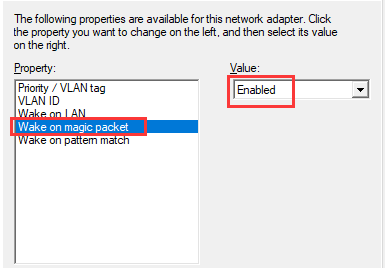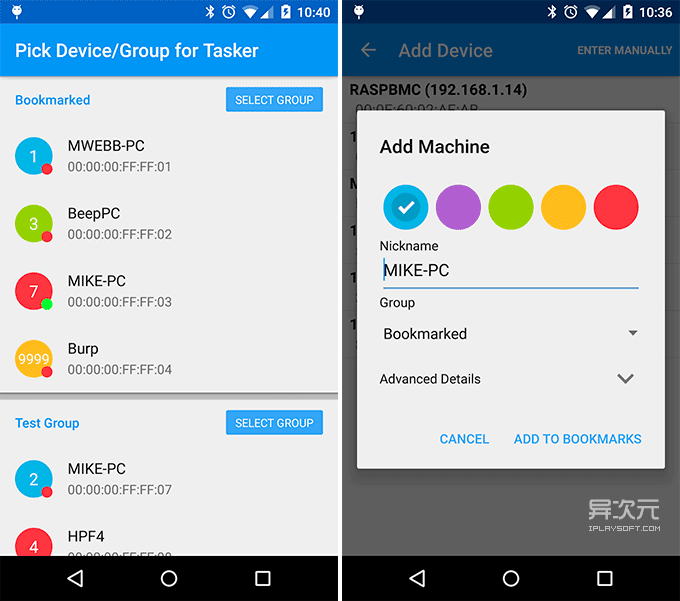
link file to have a higher priority.Īs I already had the systemd. setup networking via a netplan configuration,.Parsed configuration file /run/systemd/network/10-netplan-eno1.linkĪnd what do I find in /run/systemd/network/10-netplan-eno1.link ? Parsed configuration file /etc/systemd/network/50-wired.link Parsed configuration file /lib/systemd/network/99-default.link Then I came across this : udevadm test-builtin net_setup_link /etc/systemd/network/50-wired.link

So I figured something else had to be turning it back off and having had many such issues in the last few years with systemd taking over parts of the system I decided to start here, lo and behold:Įxamples online show something along the lines of : It would work for a few days and then refuse to wake, powering it on manually and running ethtool revealed that WoL had been disabled : Wake-on: d I had tried this approach too at first and it seemed to work, I am scheduling a system to boot each evening via WakeOnLan to run backups as the system BIOS does not provide a scheduled AC on option. This just bit me too under Ubuntu 18.04 (headless / minimal install), unfortunately the answers already listed here although they may seem to work at times are not going to provide a reliable solution as they create race conditions or fight with the likes of systemd, netplan and udev.
Wol wake on lan settings windows#
Rc5.d - Multi-User Mode - boot up in X Windows Rc3.d - Multi-User Mode - boot up in text mode This should be performed as part of run levels rc0 and rc6, noting that Linux typically has 7 different run levels (or operating modes): To get WOL to work the ethernet interface must be properly brought down as part of the system shutdown. I found those steps at a bug report at .Īccording to the author, Robbie Williamson, this works because of the following: That was the only thing that worked for me. Now test to see if it works by powering down your machine with sudo shutdown now or sudo poweroff and using a WOL tool to send a magic packet to it. Sudo chmod 755 /etc/rc0.d/wol_poweroff.sh Make them both executable: sudo chmod 755 /etc/rc6.d/wol_poweroff.sh In order for WOL to work, make sure your ethernet interface is properly being shut down by your system when you poweroff.Ĭreate a bash script called wol_poweroff.sh on the /etc/rc6.d/ directory: sudo nano /etc/rc6.d/wol_poweroff.shĬopy it to the /etc/rc0.d directory (so it also works with halt): sudo cp /etc/rc6.d/wol_poweroff.sh /etc/rc0.d/wol_poweroff.sh
Wol wake on lan settings manual#
Refer to the motherboard's manual for further details. To mitigate to the problem, the BIOS can be configured to power up when AC is restored and schedule a shutdown inside Ubuntu afterwards. In that case, at least one power cycle (power up, shutdown) has to be performed. Warning some motherboards / network controllers don't support WOL from the cold boot (S5 state, where the power to the system is physically turned off and back on again). For more information, see interfaces(5).Įnable wake on lan in BIOS, enter the BIOS setup and look for something called "Wake up on PCI event", "Wake up on LAN" or similar. # This file describes the network interfaces available on your system

In Ubuntu 16.04 set WOL_DISABLE=N in /etc/default/tlp to avoid getting WOL disabled by TLP power management.Īdd NETDOWN=no in /etc/default/halt to prevent powering off the network card during shutdownĮnable Wake on LAN in /etc/network/interfaces when static network configuration is used. It provides a system and service manager that runs as PID 1 and starts the rest of the system. Systemd is a suite of basic building blocks for a Linux system. Handles starting of tasks and services during boot, stopping themĭuring shutdown and supervising them while the system is running. Upstart is an event-based replacement for the /sbin/init daemon which You should see a line with the following: Wake-on: g Put this in it: Įnable this for the interface on boot, run the following command (change eth3 with your interface): systemctl enable should see something like this: Created symlink from to check if it's enabled, run the following command (change eth3 with your interface) and it should return enabled: systemctl is-enabled test this, reboot and run (change eth3 with your interface): ethtool eth3 This is what I did:įirst, create the file (keep the symbol). To avoid doing this manually I used systemd for this purpose. To keep WOL working, I had to re-enable it every time the system booted. I'm posting this because while googling Ubuntu 16 wol and other similar searches I came across with this post several times.

I'm new to both systems but this worked for me. Apparently Ubuntu changed upstart for systemd, in Ubuntu 15.04, Ubuntu 16.04 and presumably next versions too. I've found a better way that worked for me.


 0 kommentar(er)
0 kommentar(er)
